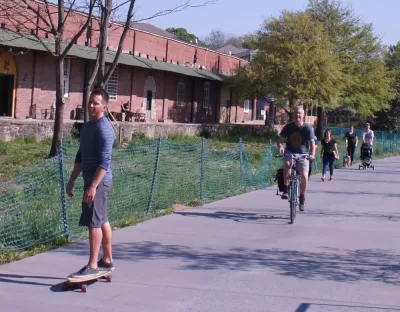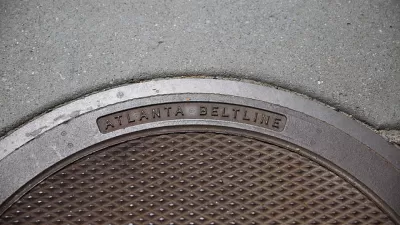An investigative collaboration between the Georgia News Lab and The Atlanta Journal-Constitution has produced a scathing critique of Atlanta Beltline Inc., the organization shepherding one of the nation's most ambitious public works projects.

Willoughby Mariano, Lindsey Conway, and Anastaciah Ondieki share the findings of an investigation by the Georgia News Lab and The Atlanta Journal-Constitution into the gap between intentions and reality on affordable housing connected to the Atlanta Beltline.
"Along with the ribbon of parks, trails and transit, Atlanta Beltline Inc. was supposed to create at least 5,600 affordable houses and apartments — a goal so important that City Council put it into law," according to the article. "But halfway to the Beltline’s scheduled completion, it has only funded 785 affordable homes, more than 200 of which remain under construction."
"At that rate, the Beltline, one of the nation’s most ambitious urban redevelopment projects, won’t meet its 2030 goal and rising housing costs may drive away more middle class residents," adds the article.
According to the investigation, some of the disappointing results with regard affordable housing are the fault of Atlanta Beltline Inc., the entity overseeing the planning and execution of the Atlanta BeltLine vision. To summarize, with more detail included in the source article:
Beltline Inc. kept units that it funded affordable for only a short time; decreased spending on affordable housing as the city entered its current housing crisis; and even passed up on millions of dollars of potential funds. The untapped funds were enough to more than double the project’s affordable housing budget, the investigation found.
FULL STORY: How the Atlanta Beltline broke its promise on affordable housing

Trump Administration Could Effectively End Housing Voucher Program
Federal officials are eyeing major cuts to the Section 8 program that helps millions of low-income households pay rent.

Planetizen Federal Action Tracker
A weekly monitor of how Trump’s orders and actions are impacting planners and planning in America.

Ken Jennings Launches Transit Web Series
The Jeopardy champ wants you to ride public transit.

California Invests Additional $5M in Electric School Buses
The state wants to electrify all of its school bus fleets by 2035.

Austin Launches $2M Homelessness Prevention Fund
A new grant program from the city’s Homeless Strategy Office will fund rental assistance and supportive services.

Alabama School Forestry Initiative Brings Trees to Schoolyards
Trees can improve physical and mental health for students and commnity members.
Urban Design for Planners 1: Software Tools
This six-course series explores essential urban design concepts using open source software and equips planners with the tools they need to participate fully in the urban design process.
Planning for Universal Design
Learn the tools for implementing Universal Design in planning regulations.
Ada County Highway District
Clanton & Associates, Inc.
Jessamine County Fiscal Court
Institute for Housing and Urban Development Studies (IHS)
City of Grandview
Harvard GSD Executive Education
Toledo-Lucas County Plan Commissions
Salt Lake City
NYU Wagner Graduate School of Public Service




























